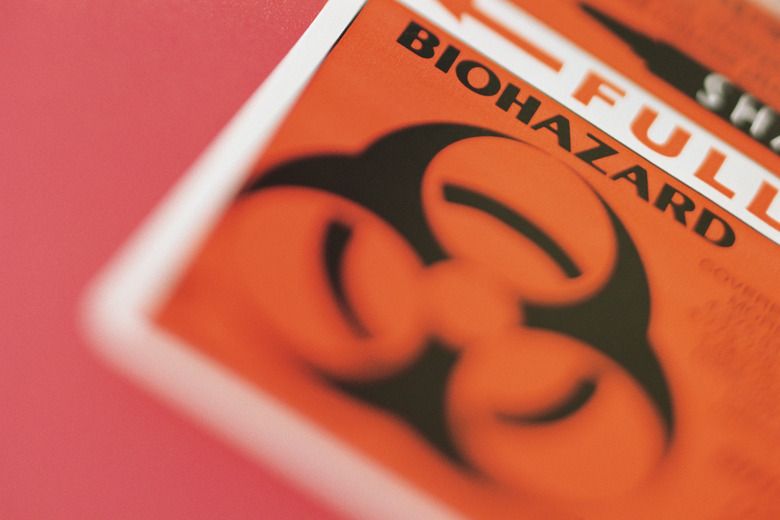What Is The Difference Between Hazardous Waste And Solid Waste?
The terms "hazardous waste" and "solid waste" might seem relatively simple and even obvious, though the legal definitions set down by the Environmental Protection Agency are complex. The EPA classifies all hazardous waste as solid waste; however, not all solid waste is hazardous. Proper waste handling is important to many small businesses, including food service, manufacturing and car repair.
TL;DR (Too Long; Didn't Read)
Solid waste consists of garbage, refuse or abandoned materials, while hazardous waste is solid waste that can cause harmful effects to human life or the environment.
Resource Conservation and Recovery Act
Resource Conservation and Recovery Act
In the Resource Conservation and Recovery Act (RCRA) passed in 1976, lawmakers set down detailed legal guidelines for various kinds of waste. The laws and definitions regarding waste are complicated because they cover many thousands of substances. If your business generates waste materials, you need a good working knowledge of the RCRA, or you should consult with someone who knows it.
Solid Waste Definition
Solid Waste Definition
RCRA has a precise and technical definition for solid waste, and it covers a lot of territory. The law states that it is any garbage, refuse or abandoned material. Interestingly, it is considered "solid" even though it may be a liquid or gas, so water that contains dissolved waste would also count.
What’s Not Solid Waste
What's Not Solid Waste
For technical and legal reasons, the EPA's definition excludes some materials from being classified as solid waste. Radioactive waste, for example, is not considered solid waste. Other examples include industry-specific items such as domestic sewage, shredded circuit boards and spent wood preservatives.
Classification of Hazardous Waste
Classification of Hazardous Waste
A fair amount of overlap exists between solid and hazardous waste. The RCRA law defines hazardous waste as solid waste that can cause harmful effects to human life or the environment.
Much waste is hazardous because it's poisonous, easily ignited or chemically reactive. A hazardous waste might contain cancer-causing chemicals, acids or solvents, for example. Other hazardous waste might not necessarily be harmful to humans directly but may be dangerous to wildlife.
Listed and Characteristic Hazardous Waste
Listed and Characteristic Hazardous Waste
A listed hazardous waste is a particular substance known to be harmful, so it has been placed on a list of such substances. A safety professional can then determine if a substance is determined to be hazardous by searching the list.
A characteristic hazardous waste is one known to possess one or more harmful physical properties. For example, concentrated sulfuric acid would be hazardous because it's highly corrosive, and corrosiveness is a harmful property.
What’s Not Hazardous Waste
What's Not Hazardous Waste
Some solid waste doesn't meet the definition of hazardous, and the EPA defines it as not hazardous. Examples include ordinary household refuse such as food packaging.
A limited number of materials might have a hazardous nature but for regulatory reasons do not count as hazardous waste. Examples include household hazardous waste and agricultural waste.
A hazardous material may also be delisted, or removed from the EPA's official list of hazardous waste, after a petitioning process and careful review of the substance.
Waste and Your Own Business
Waste and Your Own Business
Some businesses have little to worry about when it comes to hazardous waste. A tax accountant, for example, fills her wastebasket with discarded forms and reports — solid waste that is not hazardous.
Other businesses, however, need to be careful how they handle waste because of potential harm to people or nature. A car oil-change business, for example, must securely store used oil and hire a licensed waste management company to haul it away. As a business owner, you need to know if your waste is potentially hazardous, and you must see that it is managed safely and legally.
Cite This Article
MLA
Papiewski, John. "What Is The Difference Between Hazardous Waste And Solid Waste?" sciencing.com, https://www.sciencing.com/what-is-the-difference-between-hazardous-waste-and-solid-waste-13636686/. 20 September 2019.
APA
Papiewski, John. (2019, September 20). What Is The Difference Between Hazardous Waste And Solid Waste?. sciencing.com. Retrieved from https://www.sciencing.com/what-is-the-difference-between-hazardous-waste-and-solid-waste-13636686/
Chicago
Papiewski, John. What Is The Difference Between Hazardous Waste And Solid Waste? last modified August 30, 2022. https://www.sciencing.com/what-is-the-difference-between-hazardous-waste-and-solid-waste-13636686/
